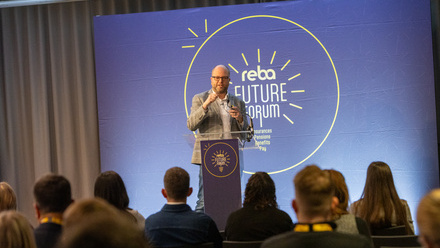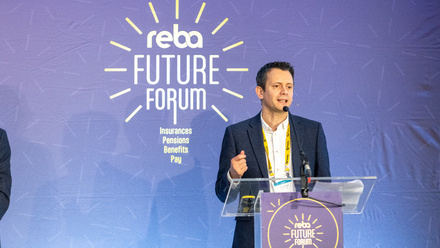The seven deadly sins of workplace financial wellbeing

But before I climb the pulpit, let me take a step back to define what we mean by workplace financial wellbeing. We see this as the segment of a company’s benefits programme that seeks to support employees’ financial needs, through a combination of services, products, communications and technologies. It can span everything from retirement and savings to budgeting and debt, insurance and tax planning.
And the goal is not just to help employees become more financially resilient and achieve their financial goals; it is also about improving mental wellbeing, by reducing instances of financial challenges.
To put this into perspective, 36% of the UK workforce say they worry about their finances and are four times more likely to suffer from associated mental health problems, according to Salary Finance’s November 2019 survey.
If employers are going to intervene, it needs to be done properly (we know that goes without saying). The challenge is, as I described above, it is a bit of a Pandora’s Box – once opened, it can be a curse if not delivered well.
With this in mind, what are the seven deadly sins employers often make when approaching workplace financial wellbeing?:
1. Sloth (laziness) – yes, pensions can be complicated and dull, but the truth is they are going to be one of the most important financial decisions each employee will ever engage with. For some HR teams, the pension plan can be demoted to the category of ‘hygiene factor’. As a result, employees miss out on the number one factor in driving good outcomes – their own engagement with the plan.
The virtue (diligence) – create a positive image for retirement planning and an engaging communications programme to promote the pension plan. Bring fun and education to the benefit, demystify it and show how small actions, such as saving a bit more, could make a big difference to their retirement outcome.
2. Greed (materialism) – this isn’t about making employees rich. There are many versions of financial wellbeing, but we would argue that the role of the business is in making employees more financially resilient, rather than more affluent. That doesn’t mean ignoring those with higher incomes or more assets, but it does mean first taking care of employees with more basic financial needs.
The virtue (generosity) – develop a culture of living within one’s financial means and maintaining a healthy relationship with money. Break the taboo of debt through education and case studies, to encourage action amongst employees.
3. Envy (jealousy) – coveting thy neighbour’s approach to financial wellbeing doesn’t give you the answers you need for your company and your employees. Many employers have tried many different initiatives that get low traction and even turn off employees to what the business is trying to achieve. Focusing on the competition, rather than the goals your employees want to achieve, can create a mismatched solution.
The virtue (gratitude) – focus on the opportunity you have to make the financial situation of your employees better, even if that means doing something very different to what others are doing.
4. Pride (egotism) – equal to worrying too much about the competition, is not worrying enough about your employees. The challenge with financial wellbeing is that it can touch on taboo topics, such as debt and budgeting. As a result, it is easy for employers to either ignore the issues or pay lip service to them, rather than change the culture of the business and attitudes towards these issues.
The virtue (humility) – prioritise the issues that most affect your employees and the solutions they want, rather than your own ideas for the programme. Listen to them and create a forum for ideas to be discussed and champions who can test ideas in the business and gather feedback.
5. Gluttony (overindulgence) – more is not more with financial wellbeing. Flooding employees with products, services and platforms doesn’t get the results you most likely want. Depending on the culture of the business and make-up of your employee base, your people will all respond differently and throwing too much at them in one go, especially on first launch, is likely to create confusion and consternation.
The virtue (moderation) – work out the right next step (including the first step) to take, be that one platform, one product or one service, communicate it well and nurture engagement with it. Then go again.
6. Lust (unbridled desire) – “the pursuit of money is the root of all evil”, as they say (although I’m not citing the Pope on that one). And so, for employers where there’s risk of a ‘cash is king’ mentality, the cautionary tale would be not to focus solely on financial wellbeing within the programme. This plays to culture again, and forsaking mental and physical wellbeing because they don’t fit with company ethos would be worrying.
The virtue (chastity) – helping employees to manage all excesses in life and work, to have a more balanced and ‘well’ life, should be at the heart of a holistic physical, mental and financial wellbeing strategy.
7. Wrath (rage) – perhaps a tenuous point to finish. But to make a real point, when things go wrong, one can easily over-react. Instead of seeing the programme as an organic, changeable initiative, it is easy have a fixed view of what should or shouldn’t be done and what the outcomes should be. Deciding not to do something for fear it may not work or fear of changing something for concern it will be viewed as a failure, is not going to achieve anything.
The virtue (patience) – work with data to fix problems. Look at issues in an objective way and find further data to challenge or corroborate your thinking before taking action. To something we’ve said before, you can’t manage what you don’t measure.
Now, I know for many of you, I’ll be preaching to the choir. But to the non-believers, I would will steal a quote from Pope Gregory himself: “The only true riches are those that make us rich in virtue”. Practice the seven virtues of financial wellbeing and the reward – a compelling and meaningful programme your employees will engage with – is there for the taking.
The author is Matthew Gregson, head of corporate at Howden Employee Benefits & Wellbeing.
This article is provided by Howden Employee Benefits & Wellbeing.
Supplied by REBA Associate Member, Howden Employee Benefits
Howden provides insurance broking, risk management and claims consulting services, globally. We work with clients of all sizes to provide dedicated employee benefits & wellbeing consultancy.







